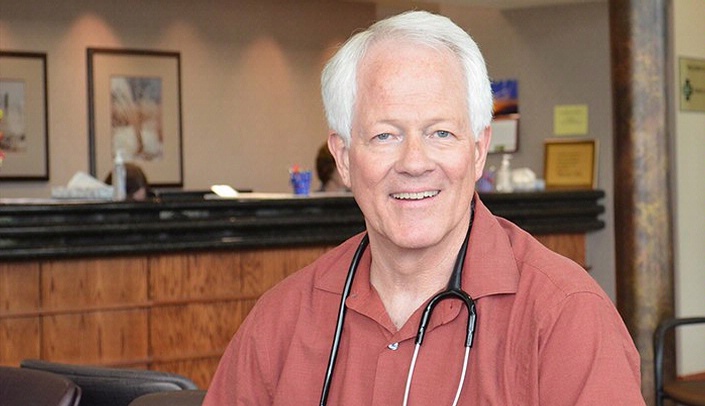There's no magic pill.
Yet, most people still think there are tricks and shortcuts that will make it simple to lose all the weight they want and more.
Milo Anderson, M.D., College of Medicine Class of 1978, surveyed nearly 1,000 patients earlier this year and found that’s exactly what they think.
Dr. Anderson, one of six physicians practicing at 23rd Family Med in Fremont, Neb., joined physicians at seven other family practice clinics in rural and urban Nebraska, as well as faculty from UNMC, to launch a project aimed at identifying strategies to better address weight concerns in primary care clinics.
The research project is aimed at understanding factors that lead to obesity, strategies to reverse it and ways to get patients motivated to become their own health advocates. It is supported by two grants totaling $150,000 from the Rural Futures Institute and the Nebraska Medical Association with plans to apply for national funding.
This team of primary care practitioners from four rural towns, Bellevue and Omaha is learning how to work together, as a primary care practice-based research network, to develop projects that will bring providers together to discuss their challenges and collaborate on finding solutions together.
"These doctors are on the front lines of primary care in Nebraska," said Jennifer Larsen, M.D., vice chancellor for research at UNMC. "As health care reform continues to impact all of us, we are looking for projects that will help us identify new ways to attack complex problems or build new teams that can enhance individual practices and improve the health of Nebraskans."
One way to do that is to build and test solutions that work and make sense for Nebraska, she said.
In collaboration with a number of UNMC faculty members, the group decided to focus on weight management because it is a critical issue for their communities and has such a broad impact on patient health.
The project also is focused on measuring patient activation and its role in weight management, a tool Lani Zimmerman, Ph.D., a professor in the College of Nursing, brought forward as an idea she has used in some of her research.
Patient activation is a way of measuring how much an individual feels they can make a difference in their own health and health care, said Robert Schwab, M.D., an assistant professor in the department of internal medicine.
"Our next step is to begin to educate our patients, without being condemning, on weight management issues and help them see the potential positive long-term impact their involvement will have on their own health," Dr. Anderson said.
